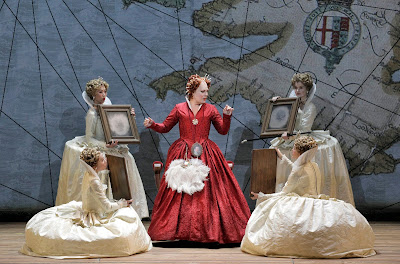Via history, literature and art, Elizabeth I ranks as one of the most recognisable monarchs to reign over England and its dominions. In opera, she makes several appearances, most notably in Donizetti’s bel canto spectacular, Roberto Devereux, non-evident in the title but one of a trilogy of operas now referred to as “The Three Donizetti Queens” or “The Tudor Trilogy” that includes Anna Bolena and Maria Stuarda. Little light filters through the plot that concerns Elizabeth’s obsession with the Earl of Essex, Robert Devereux, but in its musical language the exhilarating force of the bel canto style soars radiantly high. And it does so with monumental beauty in San Francisco Opera’s current season at the War Memorial Opera House.
 |
| Scene from San Francisco Opera's Roberto Devereux |
An elderly Elizabeth enters and a whirling unfurling of memories begin around her. Vitrines appear, containing herself as a child between her bickering parents Henry VIII and Anne Boleyn. Shakespeare pops out of a basket, a ballet sequence slots in delightfully and cut-outs of miniaturised battle ships cross the stage while surtitles give a little history lesson above. Lawless cleverly gives the immediate sense that we are firmly planted in Elizabeth’s domain and it’s from her perspective that we’ll be looking.
 |
| Sondra Radvanovsky (centre) as Elizabeth I |
In this, the third of a six performance run, Radvanovsky glistened with supreme beauty in the top range while showing off her flexibility and striking steeliness. There were early issues getting the lower range to meat-up but Radvanovsky’s command of the immediate drama remained unwavering. With exciting trills and ornamentations, Radvanovsky sensibly exuded elegance rather than flamboyance, uncannily able to convey meaning as if rendered in naturally spoken text - a first rate performance!
 |
| Jamie Barton as Sara, Duchess of Nottingham |
Against these two powerhouse performances, both of which were large in theatrical gesture, the men by no means lacked presence - for a start, Ingeborg Bernerth’s highly detailed period costumes provided distinguished authority. And the men’s more subdued acting style certainly assisted in drawing more attention to the psychological trajectory of the women. American tenor Russell Thomas’ did the job smartly and robustly in the title role, the smoothness, resonance and clarity of his voice imparting genuineness and intent. Of significance, Thomas played his part with great sensitivity and understanding in his various duets with Radvanovsky and Barton. But the best of Thomas’ performance came in his final aria, “Come uno spirto angelico...” when, behind the bars of his cell, he sang achingly of Devereux’ refusal to betray Sara.
 |
| Russell Thomas as Roberto Devereux |
The San Francisco Opera Orchestra were in superb form and conductor Riccardo Frizza led a marvellously measured interpretation that elevated the passions, the tension and occasions of pomposity throughout while giving the singers ample space to amplify.
It’s taken almost 40 years for Roberto Devereux to return to the San Francisco Opera. For this masterful production just three performances remain. If you have any slight interest in opera, get yourself a ticket because I’d hate to think you’d have to wait another 40 years to see it on stage again.
Roberto Devereux
San Francisco Opera
War Memorial Opera House
Until 27th September, 2018
Production Photos: Cory Weaver
No comments:
Post a Comment